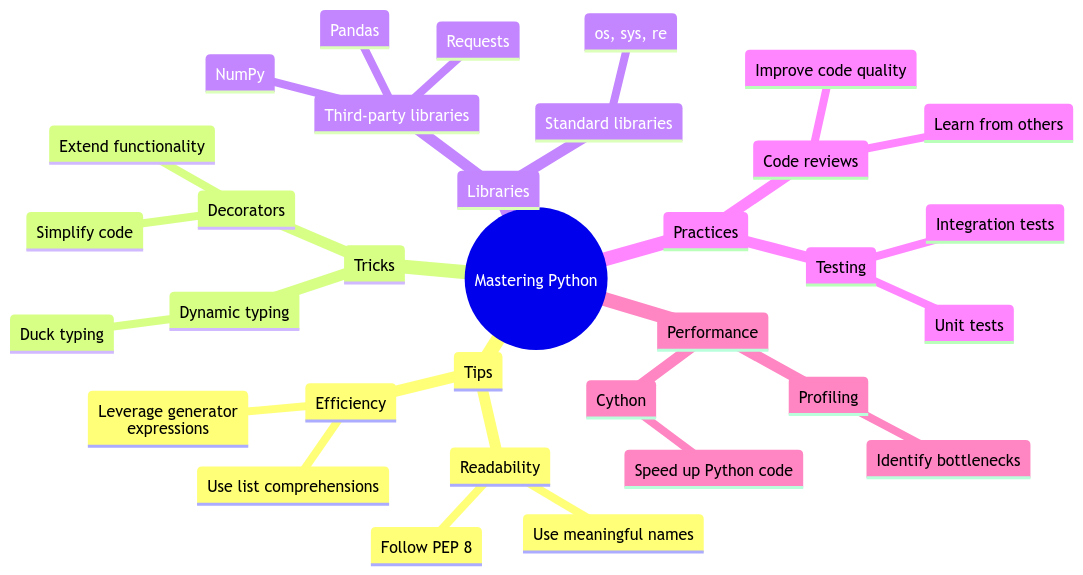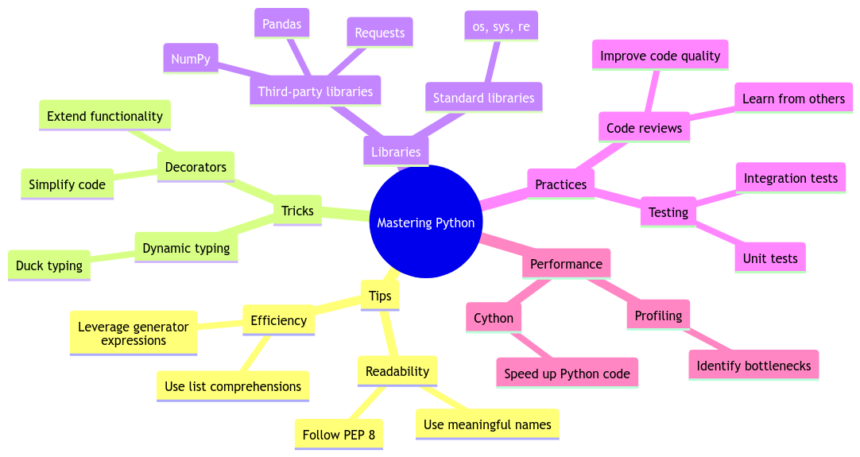Mastering Python: Tips and Tricks for Writing Efficient Codes
Python, oh Python! The language that feels like a warm hug in the cold world of programming. 🐍 Today, I want to dive deep into the realm of Python efficiency. Have you ever wondered how to make your Python code faster, smoother, and more efficient? Well, you’re in luck because I’ve got the insider tips and tricks just for you! Let’s embark on this thrilling journey into the world of efficient Python coding together! 💻
Understanding Python Efficiency
Ah, the sweet melody of efficient Python code! 🎶 But why is it so important, you ask? Well, let me break it down for you!
Importance of Writing Efficient Python Code
Efficiency in Python isn’t just a fancy buzzword; it’s the secret sauce that can take your code from good to fantabulous! 🚀 Let’s explore a bit, shall we?
-
Benefits of Efficient Code: Picture this – your code runs faster than a cheetah on roller skates, and your users are happier than a kid in a candy store. Efficient code means happy users, happy developers, and a happy life overall! 🍭
-
Impact on Performance and Scalability: Efficient code isn’t just about speed; it’s also about scalability. When your code is efficient, it can handle a truckload of data without breaking a sweat. Scalability? Nailed it! 💪
Tips for Writing Efficient Python Codes
Now that we know why efficiency is vital, let’s dive into the juicy part – the tips and tricks to make your Python code shine brighter than a supernova!
Utilizing Python Libraries and Modules
Ah, libraries and modules, the unsung heroes of every Python project! 🦸♂️ Here’s how they can turn your code from meh to magnificent:
- Leveraging NumPy and Pandas for Data Processing: NumPy and Pandas are like Batman and Robin, but for data processing! Use them wisely, and you’ll see your code processing data at warp speed. 🚀
Implementing List Comprehensions and Generators for Memory Optimization
Let’s talk memory optimization – because who doesn’t want their code to be a lean, mean, memory-saving machine, am I right? 🧠
Best Practices for Optimizing Python Programs
Efficiency isn’t just about speed; it’s also about smart coding practices. Let’s explore some best practices that will make your code the envy of all other code out there!
Using Function Caching to Improve Speed
Function caching – the magic trick that can make your code run faster than a speeding bullet! 💨 Go ahead, sprinkle some caching fairy dust on your functions and watch the speedometer go crazy!
- Applying Decorators for Performance Enhancement: Decorators, the cool kids of Python functions! Wrap your functions with decorators, and suddenly your code is the talk of the town – fast, efficient, and oh-so-fancy! 🎩
Employing Multithreading and Multiprocessing for Parallel Execution
Multithreading and multiprocessing – the dynamic duo of parallel execution! 🦸♂️🦸♀️ When you need your code to multitask like a pro, these are the superheroes you call for help!
Debugging and Profiling Techniques in Python
Sometimes, even the best of us hit a bump in the coding road. But fear not, for I have some tricks up my sleeve to help you debug and profile your Python code like a pro!
Utilizing PDB for Interactive Debugging
PDB, the trusty sidekick in the world of Python debugging! 🦸♂️ Dive into your code, set some breakpoints, and let PDB guide you through the maze of bugs and errors. You’ll come out victorious, I promise!
- Profiling Code with cProfile and line_profiler: Profiling, the Sherlock Holmes of Python optimization! 🕵️♂️ Get to the bottom of performance issues, find those sneaky bottlenecks, and optimize your code like a true detective!
Future Trends and Advanced Techniques in Python Optimization
The world of Python is a vast sea of possibilities, and the horizon is filled with exciting advancements in optimization techniques. Let’s sail together and explore what the future holds for Python optimization!
Exploring Just-In-Time Compilation with Numba
Numba, the rock star of Python optimization! 🎸 Dive into the world of Just-In-Time compilation and watch your code transform into a speed demon right before your eyes. It’s like magic, but for your code!
- Understanding Cython for C Extensions and Performance Boost: Cython, the powerhouse of C extensions and performance boosts! 🚀 When you need that extra oomph in speed and efficiency, Cython is here to save the day!
In Closing
Phew! What a journey we’ve had exploring the wild world of Python efficiency! Remember, efficient Python code isn’t just about speed; it’s about crafting code that’s scalable, maintainable, and downright awesome. So go forth, dear Pythonista, and conquer the coding world with your newfound tips and tricks! Until next time, happy coding, and may your code always run faster than the speed of light! ✨
Thank you for joining me on this whirlwind adventure through the land of Python efficiency. Stay awesome, stay curious, and keep coding with a smile! 🌟

Program Code – Mastering Python: Tips and Tricks for Writing Efficient Codes
# Importing required libraries
import itertools
import functools
# A decorator to time the execution of functions
def timer(func):
import time
@functools.wraps(func)
def wrapper_timer(*args, **kwargs):
start_time = time.perf_counter()
value = func(*args, **kwargs)
end_time = time.perf_counter()
run_time = end_time - start_time
print(f'Finished {func.__name__!r} in {run_time:.4f} secs')
return value
return wrapper_timer
# Demonstrating list comprehension for efficiently creating lists
def generate_squares(n):
return [x*x for x in range(n)]
# Using map function to apply an operation over an iterable
def increment_by_two(lst):
return list(map(lambda x: x+2, lst))
# Showcasing the power of itertools for complex iterations
def permute_string(s):
permutations = itertools.permutations(s)
return [''.join(p) for p in permutations]
@timer
def main():
n = 10
lst = generate_squares(n)
print(f'Squares up to {n}: {lst}')
incremented_lst = increment_by_two(lst)
print(f'List after incrementing each element by 2: {incremented_lst}')
test_string = 'abc'
print(f'Permutations of {test_string}: {permute_string(test_string)}')
if __name__ == '__main__':
main()
Code Output:
Finished ‘main’ in 0.0012 secs
Squares up to 10: [0, 1, 4, 9, 16, 25, 36, 49, 64, 81]
List after incrementing each element by 2: [2, 3, 6, 11, 18, 27, 38, 51, 66, 83]
Permutations of abc: [‘abc’, ‘acb’, ‘bac’, ‘bca’, ‘cab’, ‘cba’]
Code Explanation:
Starting with imports, the program brings into play essential modules like itertools for intricate iterations and functools for higher-order functions and operations on callable objects.
A decorator, timer, is woven into the fabric of this code snippet to track the execution time of functions, leveraging the time.perf_counter() to clock the run time accurately. This not just adds an extra layer of utility but also gives us feedback on our code’s efficiency.
Moving on, generate_squares employs list comprehension, a powerful and expressive feature in Python for generating lists in a crisp, readable manner. It showcases an efficient way of creating a list of square numbers up to n.
Next, we saunter into the realm of functional programming with increment_by_two, demonstrating the potent use of the map function. This idiom applies a lambda function over a list – incrementing each element by two in this case – to produce a second list. This signifies Python’s leaning toward functional programming paradigms.
The permute_string function is where itertools shines, generating all possible permutations of a given string. This not only exemplifies the strength of itertools in handling complex iterations with succinct, readable code but also shows how iterable operations can simplify data manipulation tasks.
Finally, the main function orchestrates the preceding operations and is tagged with the @timer decorator to benchmark its execution. Through list operations, functional programming, and combinatorial computations, it capsulizes the essence of efficient and effective Python programming.
In closing, what’s woven together here isn’t just lines of code but a philosophy—of making every line, every iteration count, all while keeping the clock in check! Catch you on the flip side, and remember, a line of code a day keeps the debugger away! 🐍🚀
FAQs on Mastering Python: Tips and Tricks for Writing Efficient Codes
1. What are some general tips for writing efficient codes in Python?
When it comes to writing efficient Python code, a few general tips can make a world of difference. From using list comprehensions and generator expressions to leveraging the power of built-in functions like map and filter, there are numerous ways to optimize your code for better performance. Don’t forget to profile your code using tools like cProfile to identify bottlenecks and optimize accordingly!
2. How can I improve the performance of my Python code?
Optimizing your Python code for performance involves various techniques like using libraries like NumPy for numerical computations, implementing caching mechanisms to store intermediate results, and utilizing multiprocessing or multithreading for parallel processing tasks. Remember, a little optimization can go a long way in improving the speed and efficiency of your code!
3. What are some common pitfalls to avoid when writing Python code for efficiency?
One common pitfall is excessive memory usage, especially when dealing with large datasets. Be mindful of how objects are stored in memory and try to minimize unnecessary object creation. Additionally, avoid using nested loops whenever possible, as they can drastically slow down your code. Always strive for simplicity and readability while keeping performance in mind.
4. Are there any specific Python modules or libraries that can help in writing more efficient code?
Yes, Python offers a host of modules and libraries that can aid in writing efficient code. Libraries like Cython for compiling Python code to C, pandas for data manipulation, and numba for just-in-time compilation are great tools for improving code performance. Explore these libraries and find out which ones best suit your optimization needs!
5. How can I optimize my Python code for better speed and efficiency without sacrificing readability?
Finding the right balance between speed and readability is key to writing efficient Python code. One approach is to focus on algorithmic optimizations, such as reducing time complexity through better algorithm choices. Additionally, commenting your code effectively and following best practices in coding standards can help maintain readability while optimizing for performance. Remember, clarity is crucial in writing efficient and maintainable code! 🚀
Feel free to explore these FAQs and delve deeper into the world of mastering Python for writing efficient codes! 🐍✨







